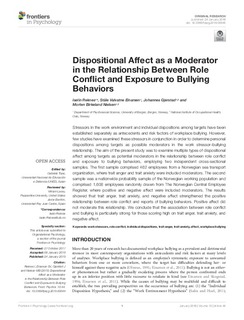| dc.contributor.author | Reknes, Iselin | |
| dc.contributor.author | Einarsen, Ståle | |
| dc.contributor.author | Gjerstad, Johannes | |
| dc.contributor.author | Nielsen, Morten Birkeland | |
| dc.date.accessioned | 2019-12-05T09:05:09Z | |
| dc.date.available | 2019-12-05T09:05:09Z | |
| dc.date.created | 2019-01-25T11:46:25Z | |
| dc.date.issued | 2019 | |
| dc.identifier.citation | Frontiers in Psychology. 2019, 10 1-12. | |
| dc.identifier.issn | 1664-1078 | |
| dc.identifier.uri | http://hdl.handle.net/11250/2631873 | |
| dc.description.abstract | Stressors in the work environment and individual dispositions among targets have been established separately as antecedents and risk factors of workplace bullying. However, few studies have examined these stressors in conjunction in order to determine personal dispositions among targets as possible moderators in the work stressor–bullying relationship. The aim of the present study was to examine multiple types of dispositional affect among targets as potential moderators in the relationship between role conflict and exposure to bullying behaviors, employing two independent cross-sectional samples. The first sample comprised 462 employees from a Norwegian sea transport organization, where trait anger and trait anxiety were included moderators. The second sample was a nationwide probability sample of the Norwegian working population and comprised 1,608 employees randomly drawn from The Norwegian Central Employee Register, where positive and negative affect were included moderators. The results showed that trait anger, trait anxiety, and negative affect strengthened the positive relationship between role conflict and reports of bullying behaviors. Positive affect did not moderate this relationship. We conclude that the association between role conflict and bullying is particularly strong for those scoring high on trait anger, trait anxiety, and negative affect. | |
| dc.language.iso | eng | |
| dc.title | Dispositional affect as a moderator in the relationship between role conflict and exposure to bullying behaviors | |
| dc.type | Peer reviewed | |
| dc.type | Journal article | |
| dc.description.version | publishedVersion | |
| dc.source.pagenumber | 1-12 | |
| dc.source.volume | 10 | |
| dc.source.journal | Frontiers in Psychology | |
| dc.identifier.doi | 10.3389/fpsyg.2019.00044 | |
| dc.identifier.cristin | 1665026 | |
| cristin.unitcode | 7476,0,0,0 | |
| cristin.unitname | Statens arbeidsmiljøinstitutt | |
| cristin.ispublished | true | |
| cristin.fulltext | original | |
| cristin.qualitycode | 2 | |
